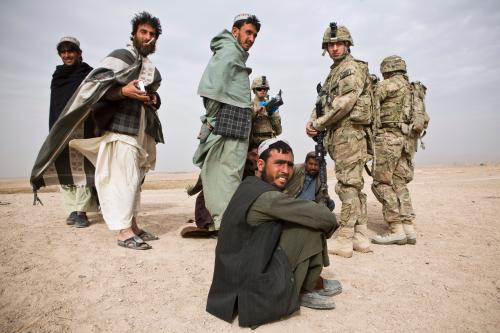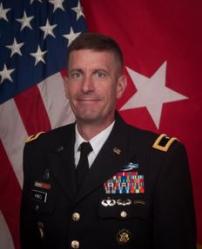There is, perhaps understandably, a fair amount of pessimism about U.S. involvement in Afghanistan. Nobody wins in Afghanistan, say many analysts, practitioners, and policymakers—it’s the graveyard of empires. It’s true that all things Afghanistan have proven to be difficult for the U.S.-led NATO efforts there over the past 15 years. But in spite of those challenges—including particularly setbacks in helping to create a stable government and security environment—I remain rationally optimistic that Afghanistan will right itself.
Having served in three combat deployments in different roles over many years, I have seen genuine progress, particularly in the Afghan National Army. With a very modest investment, the United States and the international community can achieve enough stability in Afghanistan to support our national interests in the region.
Ups and downs
As the lead coalition planner for Afghanistan’s first national elections in 2004, I was as amazed as anyone by citizens’ excitement about getting out to participate in their future. Seventy-four percent of registered Afghans cast ballots—a turnout not seen in the United States since 1900. Voters roundly rejected the Taliban, terrorism, and corruption, and it was clear that, like people everywhere, Afghans want prosperity, security, and a better life for their children. You can build on that.
When I returned for my second tour—during the 2010 counterinsurgency surge, when I was based in the historically contentious Kunar Province—the picture was more grim. Our mission was to partner with district- and provincial-level Afghan Security Forces (army and police) to support their tactical abilities on the battlefield, but it was a tall order: Taliban fighters had significant momentum, and international forces had to take more of a lead role in clearance operations. At the time, I thought that there was absolutely no way the Afghan Security Forces would be ready or capable enough to hold what we had helped clear and secure.
And that’s not to mention the governance challenges at play. The surge was also a surge of efforts to extend the government’s reach to the people. And that wasn’t three cups of tea—it was three gallons of tea. As an infantry leader, it was obvious to me that the conditions for Afghan governance and security weren’t close to being met on the ground, where it mattered, and that a continued international presence would be needed. We worked hard, but I learned that you cannot want security and good governance more than they (Afghans) do.
When I returned for my third tour in January 2015, there was an entirely new dynamic. By that time, Afghan national security forces had assumed all of our remote combat outposts and forward operating bases and had even extended their security reach. They owned the security problem, and there was an offensive mindset we hadn’t seen before. In the east of Afghanistan, for example—which was facing many attacks, and where the terrain was particularly challenging and the population tended to sympathize with insurgents—the army and police were standing and fighting. And when I returned to my old base in Kunar Province, the 2nd Brigade Commander from the 201st Corps there pleaded for U.S. and coalition assistance, but assured me there was no way he and his soldiers were going to quit the fight regardless. His sentiments—that this was the opportunity for the people of Afghanistan to re-take their country—were repeated often. It was a dramatic shift in the attitude to build capacity. When I left in the fall of last year, at the end of yet another fighting season in the country, I was convinced that he and others could carry the fight into the future.
Forward momentum
Today, therefore, I have a much more positive outlook on the future of the country and its people. There are still endemic corruption issues, numerous threat groups, extremist sanctuaries, and a need for professionalizing the armed forces. There’s also a real fear of international donor support exhaustion. There will be losses, there will continue to be setbacks, and territory will fall, be recaptured, and fall again. But based on what I’ve seen, I’m confident that the key terrain of major cities, highways, and population centers will stand firm. In the meantime, Afghanistan’s younger population is growing up free of Taliban oppression and with more access to education, training, markets, and general prosperity. They, more than anyone, have an interest in sustaining their country’s important gains. They, more than anyone, have an interest in progressing forwards.
Staying the course gives the United States and its coalition partners strategic momentum. It means keeping our modest investment of forces and capabilities to assist Afghan national security forces to keep their progress and hedge on any significant backsliding. Our presence helps counter Iranian influence in the region, as well as keeps a strategic tripwire on Pakistan (a dangerous nexus of transnational terrorism and nuclear weapons). It also means our international coalition of support, including donor funding, will be necessary to ensure Afghanistan’s government can likewise continue to progress. As the Soviets learned in the 1970s and beyond, sustained support is what matters—they continued to pay for the Afghan security forces and provide weapons even after their forces withdrew in 1989, and the effort failed only when the Soviet Union itself collapsed in 1991 and the checks stopped coming.
And so, I remain rationally optimistic that if the United States and its partners stay the course in Afghanistan—an investment that is in our vital national security interest—the situation in the country will continue to gradually improve. It will be slow going, and the process and outcomes won’t be perfect, but we cannot let perfect be the enemy of the good.





Commentary
Rationally optimistic on Afghanistan
September 7, 2016